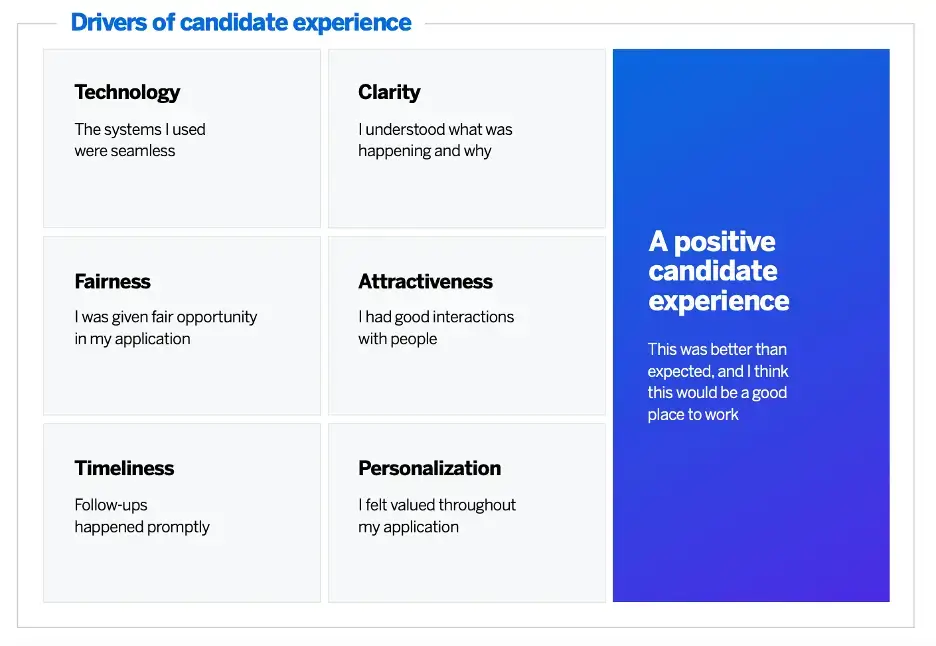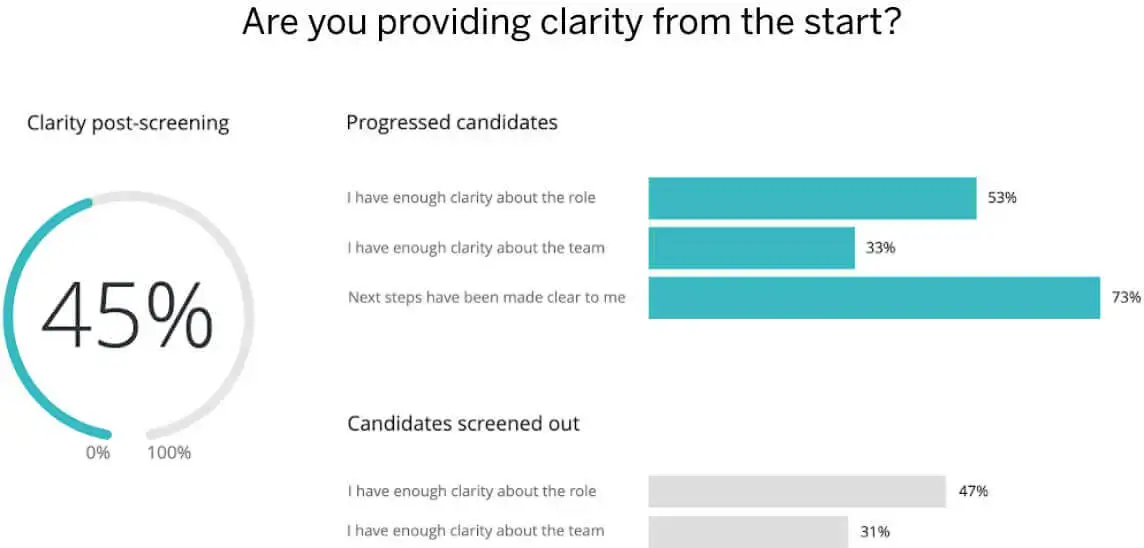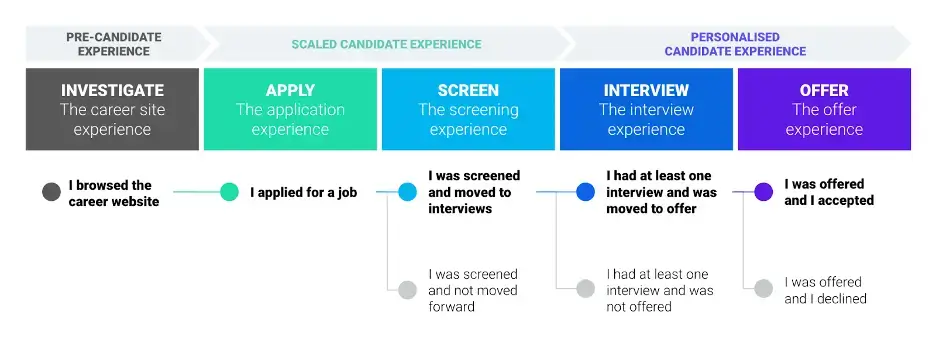In today’s job market, organisations need the best candidates to help them navigate uncertain times and emerge quicker and stronger in the upturn..
From increasing demands for very specific skill sets to new types of jobs emerging and a trend towards slower time to fill positions, today’s candidates can be incredibly selective about their job search compared to those just 10 years ago.
They wield significant power in recruitment and hiring, with greater choice of companies in almost any geography. For recruiting teams, this shift requires a change in mindset where they now need to actively market the employer to prospective recruits – making employer branding an increasingly important part of any recruiting process – while ensuring they set the right expectations to avoid misalignment and early unwanted attrition when new employees join.
With plenty of review sites and social media platforms to share their experiences on, candidates – and especially unsuccessful ones – can give real-time feedback and have a huge impact on the employer brand.
Now more than ever, it’s crucial that companies invest in measuring and managing the experiences of their candidates at every step of the hiring process. This intelligence is not only helping companies improve their attraction, recruitment and selection process workflows, but it provides great information on how to best retain great talent.
From where candidates drop out in the application process, to acceptance rates and the optimal time to hire, organisations are collecting operational data that’s telling them what’s happening at every step of their hiring processes – but less is being done to capture the why.
This gray area underlines why collecting feedback from both candidates and hiring managers is so important. With experience data (X-Data), you can obtain insights that drive improved talent branding, enhance your entire hiring process, maximise resources and deliver an exceptional candidate experience.
Learn about our candidate experience management software
What is candidate experience?
The candidate experience focuses on how job seekers perceive and feel about a company’s job application process (and the company itself) from beginning to end – and it also combines the experiences of the hiring manager throughout the same process.
Both experiences need to be optimised if the organisation is going to get the right volume of new joiners at the right pace – and for rejected applicants to walk away with a positive feeling, prepared to speak positively about the organisation and reapply if a suitable role comes up in the future.
It’s a term that covers the four main recruitment touchpoints: investigate, application, screening, interview and offer.
What makes a positive candidate experience?
There are six critical factors that drive a positive experience across the candidate journey.
While these factors can create positive candidate experiences, they can also create negative ones if neglected. If you’re not sure where the pain points are in your current process, gathering feedback with a candidate experience survey can illuminate the areas you need to improve.
1. Technology
A positive candidate experience often begins with how the company utilises technology during the hiring process. This includes everything from the ease of use and functionality of the job portal, to the seamless integration of communication platforms, scheduling tools and assessment software.
Technology isn’t just a means to an end, it’s an opportunity to impress – not only expediting the process but also leaving a lasting impression on the candidate.
2. Clarity
Your candidates are human beings with hopes, dreams and ambitions. Treat everyone as such with clear, consistent communication from you about their status at every step of your hiring process.
From job descriptions, which should clearly outline the role’s responsibilities and expectations, to the feedback after the interviews, every interaction should be transparent and understandable. A candidate who understands what is happening, why it’s happening and what the next steps are will feel more comfortable and confident throughout their application process. This is true for both candidates who continue through the process and those who are unsuccessful.
3. Fairness
Candidates should feel that they are being evaluated based on their skills, qualifications and potential – not factors unrelated to the job. This is why the use of objective evaluation tools and standardised interview processes is so important in hiring processes.
Your company can send a strong message about its commitment to equality to current and future applicants by ensuring diversity and inclusivity in the recruitment process.
4. Attractiveness
This is less about the power of your brand than it is about a candidate’s interactions with your people.
The company’s image, culture and values are communicated through every interaction the candidate has with your employees. If those interactions are positive, respectful and engaging, candidates will be more likely to see the prospect of joining your company as an attractive one.
5. Timeliness
An efficient process and reliable hiring infrastructure doesn’t only make the candidate experience better, it saves your business time and money too. On the flip side, a delayed candidate experience can create frustration and anxiety, which could lead to the best candidates slipping through your fingers.
Simple measures like checklists for your standard procedures, email templates for each stage of the process and clear timelines for every stage of the process can keep candidates engaged and interested. And probably most important of all, invest in quality people analytics software to recruit, train and retain the best.
6. Personalisation
A personalised candidate experience means treating each candidate as an individual, recognising their unique skills and potential, and making them feel valued and respected.
It could mean providing personalised feedback and outlining to them the attributes you feel they would bring to the role and company.

Candidate experience surveys
Surveys are a key tool for evaluating and enhancing the candidate experience.
They help organisations gain a comprehensive understanding of a candidate’s journey – right from the application phase to the final offer, or where they are rejected along the way. Understanding this journey enables companies to improve their hiring strategies, leading to higher quality talent acquisition and a more competitive position in the job market.
Surveys can be used to understand what people think about the whole candidate experience and why, and deep dive into specific stages and factors – like the technology or communication used throughout the process.

Why is a good candidate experience so important?
You might be thinking that candidate experience affects only a small number of people – not enough to make a big difference to your business. But there are a few reasons why you should make positive candidate experiences a priority.
Be more attractive to high-quality candidates
There’s no denying that the employment dynamic has shifted. With increased visibility of jobs, a normalisation of job-hopping, and emerging skills gaps the best candidates have their pick of employers.
No matter how high the starting salary is or how attractive the benefits package, they’re likely to be put off taking a job offer if the candidate experience was poor or they’ve heard bad things from others.
Build a pipeline of good candidates
Creating a positive candidate experience is crucial to cultivating a robust pipeline of high-quality qualified candidates. Because even if they’re not selected initially, a good experience can encourage rejected applicants to reapply.
Hire faster
By fostering a swift, transparent, and respectful recruitment process, you can encourage candidates to be more responsive and accelerate your hiring timeline – saving time, money and helping you plug your gaps quicker.
Reduce the number of good candidates from dropping out of the process
If your candidate experience is poor, it may lead to strong applicants withdrawing. But by ensuring a smooth, engaging and transparent hiring journey, your company can retain the interest of top candidates – minimising dropouts and preventing potential talent loss.
Increase ramp time
A good candidate experience can directly impact how quickly your new hires can hit the ground running and deliver what you need them to.
By keeping the right candidates engaged and setting clear expectations during the hiring process, you ensure they have a strong understanding of their role and responsibilities from the start – and reduce the time and cost onboarding processes typically require.
Reduce turnover of new joiners
Many organisations report higher levels of attrition among new joiners. A big reason for this is a candidate experience that lacks clarity or sets unrealistic expectations, which help to ensure that both parties aren’t on the same page come day one.
A comprehensive, honest picture of the role and company culture, on the other hand, can align expectations correctly and increase satisfaction and retention among new hires.
Employees can be candidates too
It’s also important to bear in mind that internal applicants (your current employees) are often part of the candidate experience as well.
If they’re unsuccessful in applying for a new job within your company, what happens next matters. Will they maintain the same level of engagement and satisfaction based on their experience, or will they look elsewhere because of it?
The answer is important – and taking a closer look at the candidate experience (and actioning on that feedback) can help tip the scales in favour of retaining your top talent.
Strengthen your employer brand
Yes, the number of people applying to work for you is relatively small, but each one of them has friends and family, colleagues in the same sector and possibly recruitment consultants who will hear how it went.
Job interviews are memorable events and people will be telling the tale of your good (or bad) candidate experience long after the event is over. A rejected candidate could one day become a customer – especially in industries like retail and telecoms – and so it truly pays for an organisation to ensure they are treated well and don’t have a negative impression of your company, brand and products.
The 5 stages of candidate experience

Every candidate experience has a clear flow from start to finish, but within every individual journey and at every stage of it there are myriad experiences dictated by nearly countless factors.
Investigating each stage of the candidate experience can generate insights that show you where the gaps in your process lie and how you can take action to turn a poor candidate experience into a great one. Here’s how you can break it down.
Application
The application stage is pivotal for the candidate experience, with technology and transparency the two key drivers of a positive process.
Here good tech means a streamlined, user-friendly application system, which goes a long way to assure candidates that their applications are in capable hands. Instant application confirmations and clear timelines enhance the experience further, and are measurable markers of a successful tech interface.
Technology enables transparency at this stage, and it’s also provided by the level of detail you choose to disclose. Our Future of Work study revealed that 80% of job seekers consider remote work availability a key factor, so clearly articulating such role requirements assures candidates that they have the necessary information before applying.
Screening
This stage marks the start of active engagement with candidates, making it crucial for setting clear expectations through good communication.
Here the pillars of good communication are clarity, fairness and timeliness. Clarity sets clear expectations, fostering trust through open communication; fairness ensures a merit-based evaluation rooted in equal opportunities for all; timeliness underscores professionalism through prompt responses and respect for candidates’ time.
Technology can again significantly aid recruiters at this stage, from scheduling phone screens to capturing insightful recruitment process data. To allow for effective communication, hiring managers should optimise and automate the screening process wherever possible.
Interview
The interview stage requires recruiters to guide the job seeker, manage expectations and handle logistics. It’s the phase that’s particularly prone to gaps that could lead to losing top candidates.
Identifying and rectifying these gaps can be achieved by seeking candidate feedback and analysing the data collected to guide changes in approach. These changes could be anything from steps to eliminate interviewer bias, to new resources that do a better job of highlighting your company culture during in-person interviews.
Closing any gaps during the interview process ensures that top candidates remain engaged and interested – setting the stage for a successful offer.
Offer
The offer stage marks the culmination of a successful matching process between candidate aspirations and organisational offerings. Achieving this comes as a result of effective relationship-building between candidate and company, and an in-depth understanding of the recruit’s needs.
It’s important to remember that the majority of candidates won’t receive an offer, and that they should still have a positive experience. If your company receives 150,000 applications per year and hires 1,500, that leaves 148,500 candidates who will share their experience with others. Offering them clarity around the decision-making processes, personalising your feedback where feasible, and doing so in a timely manner – while emphasising that the application has been fully considered – is time very well spent.
Ensuring a positive experience for all candidates can turn even those rejected into brand ambassadors – potentially paving the way for future applications and patronage – and build your company’s reputation in the job market.
Learn about our candidate experience management software